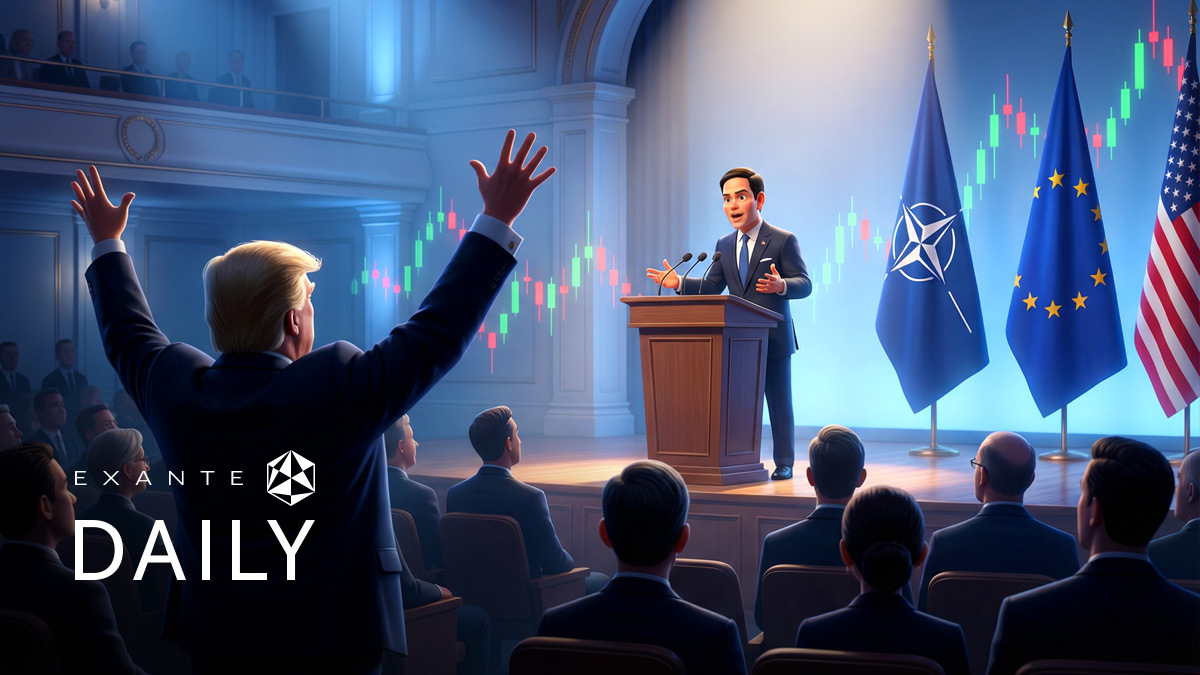
The Fed battles on

- Key data to move markets this week
- Global market indices
- Commodity sector news
- Currencies
- Global macro updates
Key data to move markets this week
EUROPE
Thursday: EU leaders summit.
Friday: EU leaders summit, German S&P Global/BME Composite, Manufacturing and Services PMIs, Eurozone S&P Global Composite, Manufacturing, and Services PMIs, and a speech by Deutsche Bundesbank President Joachim Nagel.
Monday: German IFO Business Climate, Current Assessment and Expectations.
Wednesday: German GfK Consumer Confidence.
Thursday: ECB Economic Bulletin, Eurozone Consumer Confidence and Business Climate surveys, and German Harmonised Index of Consumer Prices.
UK
Thursday: Bank of England Interest rate decision, Monetary policy summary, and Bank of England Minutes.
Friday: GfK Consumer Confidence, Retail sales, S&P Global/CIPS Composite, Manufacturing, and Services PMIs and a speech by BoE MPC member Catherine Mann.
Monday: A speech by BoE Governor Andrew Bailey.
Wednesday: FPC statement and meeting minutes.
US
Thursday: US new home sales, US Treasury Secretary Janet Yellen testifies to a House Appropriations subcommittee, Chicago Fed National Activity Index, Initial jobless claims, and Continuing jobless claims.
Friday: Durable Goods Orders and Nondefense Capital Goods Orders.
Tuesday: Housing Price Index, S&P/Case-Shiller Home Price Indices, Consumer Confidence.
Wednesday: Pending Home Sales.
Thursday: GDP, Core personal consumption expenditures, Personal Consumption Expenditure Prices, Initial jobless claims, and Continuing jobless claims.
Daylight savings time begins in the UK and Europe on Sunday, 26 March.
Nasdaq 100 +4.39% MTD and +14.91% QTD
Dow Jones Industrial Average -0.29% MTD and -1.77% QTD
NYSE -4.46% MTD and -2.92% QTD
S&P 500 +0.82% MTD and +4.25% QTD
Mega caps. The mega caps had a mixed week with Alphabet, Apple, and Tesla all up on the week. Amazon, Microsoft, and Meta Platforms were all down on the week. Microsoft announced on Tuesday that it was slashing 9,000 jobs.
According to Bloomberg news, Apple, Meta Platforms, and Google’s parent, Alphabet, want Congress to limit Section 702 of the Foreign Intelligence Surveillance Act (FISA) which is due to come up for renewal at the end of this year. Under Section 702, the agencies can compel companies without a warrant to turn over communications, phone records and other data for national security investigations that target non-US citizens living outside the country, even if the communications of American citizens are involved. As noted by The Hill, the House Intelligence Committee has just launched a working group, composed of three members of each party, to review section 702. Intelligence Committee Chair, Mike Turner, a Republican, said in a release announcing the appointment of members to the group that “Unfortunately, there have been significant and egregious abuses of Section 702 that have eroded the trust of the American people, putting FISA’s reauthorization at risk.” The intelligence community is seeking to have section 702 renewed with Attorney General Merrick Garland and Director of National Intelligence Avril Haines reported to have sent a letter to lawmakers noting information acquired through Section 702 helped disrupt terrorist plots and attempts by adversaries to recruit US.-based spies.
Energy stocks rebounded in the earlier part of this week before the Fed’s rate rise appeared to have left some stocks struggling with Apa Corp (US), Coterra Energy, Pioneer Natural Resources Company, Exxon Mobil Corporation all up while Energy Fuels and Occidental Petroleum were down.
Materials and Mining stocks were also mixed this week with Eastman Chemical Company, Yara International, Sibanye Stillwater, CF Industries Holdings, International Paper Company, and Mosaic were down, Albemarle Corporation, and Newmont Mining ended relatively flat, and Dow Chemical and Freeport-McMoran were up.
Albemarle Corporation announced on Wednesday that it had chosen Chester County, South Carolina, as the location for a $1.3 billion lithium processing plant that it hopes will become widely used by the growing US electric vehicle industry. The industry is receiving significant tax credits and other incentives through the US Inflation Reduction Act.
European Stock Indices
Stoxx 600 -3.03% MTD and +5.24% QTD
DAX -0.97% MTD and +9.28% QTD
CAC 40 -1.88% MTD and +10.15% QTD
IBEX 35 -4.10% MTD and +9.48% QTD
FTSE MIB -3.48% MTD and +11.88% QTD
FTSE 100 -3.93% MTD and +1.94% QTD
Other Global Stock Indices
MSCI World Index -0.22% MTD and +3.68% QTD
Hang Seng -0.98% MTD and -0.96% QTD
Fixed Income
US 10-year Treasuries at 3.44%.
German 10-year Bunds at 2.33%.
UK 10-year Gilts at 3.45%.
Yields were up following the Fed announcement on Wednesday as it became clearer that the Fed was still willing to stay higher for longer as long as the data called for it to do so.
Commodities
Gold futures to $1,991.50 an ounce.
Silver futures to $23.05 per ounce.
West Texas Intermediate crude futures to $70.90 a barrel.
Brent crude futures to $76.69 a barrel.
Gold has climbed over 7% so far this month due to concerns surrounding the soundness of the global banking sector.
Oil rose following the Fed announcement on Wednesday as the USD fell to its lowest level since 2 February, thereby supporting oil demand by making it cheaper for buyers using other currencies. This price rise was despite US crude stocks rising by 1.1 million barrels in the week to 17 March according to the Energy Information Administration.
Currencies
USD fell on Wednesday after the Fed raised its key rate by a quarter of a percentage point and pointed to just one more rate hike this year. The GBP is +1.40% YTD against the USD as rising CPI on Wednesday raised expectations of another rate hike by the BoE on Thursday. The EUR is +1.45% YTD.
Bitcoin +18.02% MTD and +64.86% YTD.
Ethereum +8.03% MTD and +44.76% YTD.
Note: As of 5:30 pm EST 22 March 2023
Global Macro Updates
The Fed strikes back. The Fed raised rates 25 basis points on Wednesday. Fed officials forecast another quarter point in rate increases this year to a peak range of 5% to 5.25%, in line with its December estimate. However, the Fed's monetary policy committee removed previous references to the need for “ongoing” rate rises.The Fed statement said that the “US banking system is resilient” and that “recent developments are likely to result in tighter credit conditions for households and businesses and to weigh on economic activity, hiring and inflation. The extent of these effects is uncertain.” The Fed also said “additional policy firming may be appropriate” to lower inflation to the Fed’s 2% target. This has been interpreted by markets that the Fed is close to ending its hiking cycle. The tightening of credit conditions following on from the collapse of SVB will take time to work through but will very likely hit lending rates for small and medium sized companies, likely reducing future labour demand and leading to higher rates of unemployment. Powell said the collapse of SVB would have a comparable impact to an extra interest rate hike. New economic projections from Fed officials see the unemployment rate rising to 4.5% from the current 3.6% and GDP growth downgraded from December’s forecast of 0.5% to 0.4%.
US Treasury Secretary Janet Yellen told the Senate Appropriations subcommittee hearing on Wednesday that she had not considered or discussed "blanket insurance" for US banking deposits without approval by Congress. Yellen also said the administration was not considering expanding bank deposit guarantees beyond the current limit of $250,000.
BoE under pressure. CPI jumped 10.4% in February. Inflation for food and non-alcoholic drinks rose to 18.0%, the highest since 1977. Core inflation, which excludes energy, food, alcohol and tobacco, rose to 6.2% from 5.8% in January. The surprise jump up in inflation, as noted by the Financial Times, has reinforced fears that price rises are being driven more by domestic pressures in the services sector, than the external shock of high energy prices. This will put more pressure on the Bank of England to keep raising interest rates today despite the expected tightening of financial markets following the collapses of SVB and the rushed takeover of Credit Suisse by UBS. Investors now expect a quarter-point rate rise from the BoE. However, according to Reuters, in a letter to the Treasury Committee, the BoE said the strains affecting global banks could still hurt Britain's economy, through higher borrowing costs for consumers and businesses. BoE Governor Andrew Bailey is reported to have written “Should there be further volatility and/or sharp moves in asset prices, there are risks it could trigger the crystallisation of previously identified vulnerabilities in market-based finance, amplifying any tightening in credit conditions.”
UK Prime Minister Rishi Sunak was able to get the part of the post-Brexit Northern Ireland deal, known as the Windsor framework, passed by 515 votes to 29 despite revolt by three ex-Tory leaders. As noted by MPs voted to back the so-called Stormont Brake, a new mechanism that allows the UK to stop changes to EU laws automatically applying in Northern Ireland.
A stress-free ECB? According to Reuters, the ECB's chief economist Philip Lane said market jitters may turn out to be "a non-event" for monetary policy, or could affect it at the margins, but the odds of a crisis that completely rewrites the outlook remained long. The Chair of the European Central Bank's Supervisory Board, Andrea Enria, said on Tuesday that “there is no direct read-across of the US events to euro area significant banks… the banks we supervise do not exhibit the outlier features of extreme interest rate risk and predominant reliance on a concentrated, uninsured deposit base.” ECB President Christine Lagarde said the ECB's interest rate hikes may be magnified if banks become more risk averse and start demanding higher rates when lending, likely implying the central bank would need to do less. Italian central bank governor Ignazio Visco is reported to have said on Wednesday that bank credit had come to a halt in Europe and it was "crucial" to avoid a full-blown credit crunch. He said the collapse of Credit Suisse and the Silicon Valley Bank should be seen as an "alarm bell" for the European Union because "we don't have an instrument of immediate intervention" to resolve banking crises, such as those adopted by Switzerland and the United States.
The SEC zeroing in on Coinbase. Coinbase Global said it received a notice from the SEC formally declaring the securities regulator’s plans to bring an enforcement action against it. This comes after Coinbase said the SEC alleges the company may be operating in violation of securities laws in the running of its exchange and staking services. According to Coindesk.com, the SEC targeted Coinbase with a so-called Wells notice that informs the business that the agency is planning a future action that could include an injunction or cease-and-desist without specifying exactly what activity it found in violation. Shares of Coinbase dropped nearly 13% to $67.33 in extended trading after the company revealed it had received the Wells notice. According to Bloomberg, the Wells notice regards aspects of its exchange including an undefined segment of its listed digital assets as well as the staking service Coinbase Earn and Coinbase Wallet. A Wells notice usually comes towards the end of an investigation and before the SEC issues charges. Companies are given time to rebut the agency’s allegations. Coinbase has until 29 March to do so. The company said that until the resolution of any legal processes, the exchange’s offerings would continue to operate as usual.
DISCLAIMER: While every effort has been made to verify the accuracy of this information, EXT Ltd. (hereafter known as “EXANTE”) cannot accept any responsibility or liability for reliance by any person on this publication or any of the information, opinions, or conclusions contained in this publication. The findings and views expressed in this publication do not necessarily reflect the views of EXANTE. Any action taken upon the information contained in this publication is strictly at your own risk. EXANTE will not be liable for any loss or damage in connection with this publication.
本文提供给您仅供信息参考之用,不应被视为认购或销售此处提及任何投资或相关服务的优惠招揽或游说。金融工具交易存在重大亏损风险,未必适合所有投资者。过往表现并非未来业绩的可靠指标。




